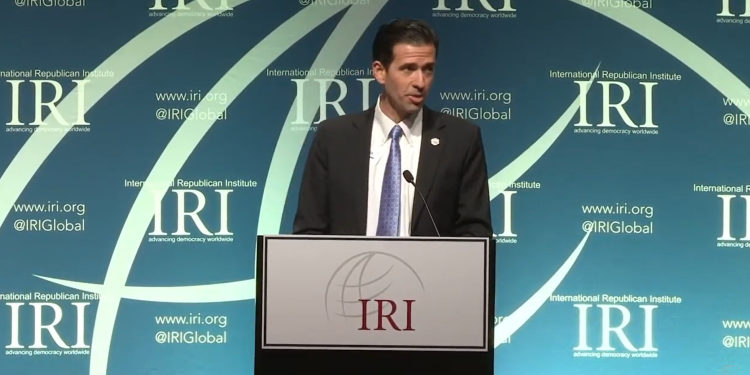IRI finds systemic intimidation, harassment and unlevel playing field in Georgia‘s 2024 parliamentary elections
International Election Observation Mission of the International Republican Institute (IRI) released today its preliminary statement regarding Georgia’s parliamentary election. The report includes a number of key findings and recommended actions.
The IRI mission will be led by IRI president Daniel Twining, former U.S. Rep John Shimkus and Swedish Member Margareta Cederfelt. These teams were assisted by a core team of thematic experts, who have been analyzing and observing the pre-election process for months.
“Elections are all about people choosing their own destiny and the elected officials who will lead them. As the governing party of Georgia has done to ensure an outcome, bending and abusing the systems to guarantee a result takes away the right of the people to exercise genuine choices and hold their leaders responsible,” said Twining. “Georgia’s political elite has monopolized power for too long by using state institutions to monopolize control. The story of Georgia’s election in 2024 is still unfolding. But the people of this nation deserve better than the politicians are giving to them.”
Shimkus said that on election day, there was systematic intimidation and harassment both inside and outside of polling stations. This created an atmosphere of fear. “The government must take drastic action to ensure public confidence in the political process.”
Cederfelt said that the government’s harassment and intimidation against voters and civil society, not only during election time, but also well before, has undermined Georgia’s democratic foundations. “I fear that the deep mistrust between the political elite and the general public will have long-lasting implications in the aftermath of the election.”
IRI released seven key findings as part of its preliminary report.
* Voters were intimidated and harassed in and outside of polling stations, not only on the day of the election but also during the pre-election phase.
* The Law on Transparency and Foreign Influence, which was passed in 2010, has undermined the freedoms of expression and association.
* There was widespread intimidation and pressure against public sector workers and recipients of social services.
* There have been concerns raised about political bias and imbalance in the election commissions.
* The current legal, regulatory and political landscape has created an unlevel playing field for elections that is a major structural barrier to truly competitive elections.
* The investigation and adjudication process for complaints relating to elections is inadequate, ineffective and lacking in meaningful remedies.
* The Central Election Commission’s (CEC) independence and impartiality are not well-respected by the public.
In its preliminary report IRI made the following nine recommendations.
The Georgian parliament should repeal the Law on Transparency of Foreign Influence.
* The CEC should implement reforms in order to balance the political composition at all levels of commissions.
* The CEC must remove the arbitrary criteria of residency to allow voters to choose where to vote.
* The CEC should use uniform voting and tabulation procedures in order to ensure equality and simplify voter education.
* The temporary precinct election commissioners should undergo a thorough vetting process to ensure that they have not received short-term contracts from local government within six months prior to an election.
* The Parliament should amend the Law on Political Union of Citizens in order to allow coalitions.
* The CEC must ban the use video recording devices in polling stations. This will help to reduce the fear and intimidation that can be created.
* The Courts should review the process for investigating and adjudicating complaints related to elections.
* The CEC must take immediate action to ensure that voting is conducted in a calm, secure and orderly manner at the polling stations.
IRI will continue to follow the post-election processes and will issue a final comprehensive report in the next few weeks. This report will include additional analysis and recommendations for future election. IRI is committed to supporting Georgia’s democratic development.
About the Mission
IRI’s 250th election observation mission has been to Georgia in 2024. IRI has made countless reform recommendations to host countries since 1984, including for Georgia and other nations that want to improve the quality of their elections. This preliminary statement summarizes 48 election observers’ findings and recommendations in the lead-up to the October 26th elections.
The analysis of the preelection environment began early June. There were 20 international Long-term (LTO) Observers on the ground in July and 28 short-term (STO) Observers who observed the election week. Long-term observers were deployed in ten regions of Georgia: Imereti (Imeri), Kakheti (Kakheti), Samegrelo Zemo Svaneti (Samtskhe-Javakheti), Shida Kartli (Kvemo Kartli), Ajara, and Tbilisi. The mission spent approximately 100 days observing all 73 districts in Georgia, meeting with political parties, media, election officials and officials from the judiciary. They also met with government and security officials as well as civil society organizations and community leaders.
The mission adhered to the principles of non-interference and worked closely with other regional observer missions, including the National Democratic Institute.
The IRI is a nonprofit, nonpartisan organisation that promotes freedom and democracy by helping political parties become responsive, strengthening transparency and accountability governance, and increasing participation of marginalized groups, including women and young people, in the political process. Visit www.iri.org for more information.
Read More @ georgiatoday.ge




